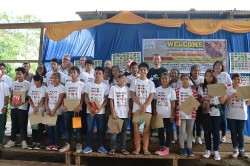Press Release, 09. September 2016
Flying beauties: school kids in the Philippines learn what insects do for rice
The large international project LEGATO organizes the first public citizen science event for arthropods in the Philippines
Science advances society and fosters sustainability, so why not involve everyone in building a better future? Culminating in the first citizen science workshop for arthropods to take place in the Philippines, one of the main objectives of the 5-year, Helmholtz Centre for Environmental Research (UFZ) coordinated research project, LEGATO, was also to find ways to engage society in collecting research data and applying research findings in practice.

Photo: Pavel Stoev

Photo: Pavel Stoev
The workshop titled "Flying beauties" took place in August at the Kinakin Primary school, Banaue Municipality, Ifugao Province, Philippines. If focused on butterflies and dragonflies and their roles in the surrounding natural and agricultural landscape. This workshop was the culmination of several weeks of active preparation together with the different groups of participants, and, in fact, only the set off of the Flying Beauties citizen science competition that will be open until the end of the year.
Thirty students from two local schools and their teachers, alongside a group of senior citizens and tour guides, had the unique chance to take part in an event, where important project results presentation was combined with on-field data collection and testing of findings.
Butterflies and dragonflies are not only attractive insects, but also in the spotlight of LEGATO research due to their relevance for building sustainable rice ecosystems. It comes as no surprise that these two animal groups were also central to LEGATO’s citizen science day, where participants were given the simple yet exciting task to find and photograph featured species on field to then enter a photo contest.
Children and adults alike were on the search for species selected by LEGATO scientists on the basis of their importance for rice ecosystems in the region, rarity and conservation status. The exercise combined in one task two key objectives of the project: raising the awareness of people for the beautiful nature around, getting them interested in learning more about it and motivate them to use modern technology to collect data in a playful way.
After several hours on field armed with digital cameras and fresh knowledge on butterflies and dragonflies, the citizen science team came back with a great selection of photographed species. The exercise that took place as a part of LEGATO final meeting was just a first highlight for the Flying Beauties project which aims to showcase the benefits of citizen science, where all kind of people can contribute to biodiversity knowledge and get aware and learn about their local nature.
"We saw some real enthusiasm and I am sure lots of the facts we explained about the different species and their importance for rice will stick with the children taking part," explains Norbert Hirneisen. "We are positive that we created genuine interest to science and its applicability in everyday life in the contestants. Additionally, the photographic evidence collected this day could be useful in further research!"
"Real world impact of research findings can be secured by translating results and passing them on to the end users in an understandable and engaging way," comments project coordinator Prof. Josef Settele, UFZ. "Our event demonstrates how an entertaining approach and use of new technologies can engage citizens in data collecting and re-use of research findings in their everyday lives."
LEGATO is a BMBF (German Federal Ministry of Education and Research) funded project aimed at the elaboration and testing of generally applicable principles within the frame of ecological engineering - an emerging discipline, concerned with design, monitoring and construction of ecosystems. LEGATO is open to collaborate with other projects and to share the developed system and technology.
Further information:
Video: https://drive.google.com/file/d/0BxxLHfAc0JQVX0NvZG9oRnNveVU/view?usp=sharing (copyrighted to Nawe Geofrey and can be used only in relation to this story and with the due credits)
Website: www.flying-beauties.org
Further information
Prof. Dr. Josef Settele
UFZ-Department Community Ecology
josef.settele@ufz.de
Norbert Hirneisen
science4you
info@flying-beauties.org
UFZ press office
Susanne Hufe
Phone: +49 341 6025-1630
presse@ufz.de
In the Helmholtz Centre for Environmental Research (UFZ), scientists conduct research into the causes and consequences of far-reaching environmental changes. Their areas of study cover water resources, ecosystems of the future, environmental technologies and biotechnologies, the effects of chemicals in the environment, modelling and social-scientific issues. The UFZ employs more than 1,100 staff at its sites in Leipzig, Halle and Magdeburg. It is funded by the Federal Government, Saxony and Saxony-Anhalt.
www.ufz.deThe Helmholtz Association contributes to solving major challenges facing society, science and the economy with top scientific achievements in six research fields: Energy; Earth and Environment; Health; Key Technologies; Matter; and Aeronautics, Space and Transport. With some 39,000 employees in 19 research centres, the Helmholtz Association is Germany’s largest scientific organisation.
www.helmholtz.de